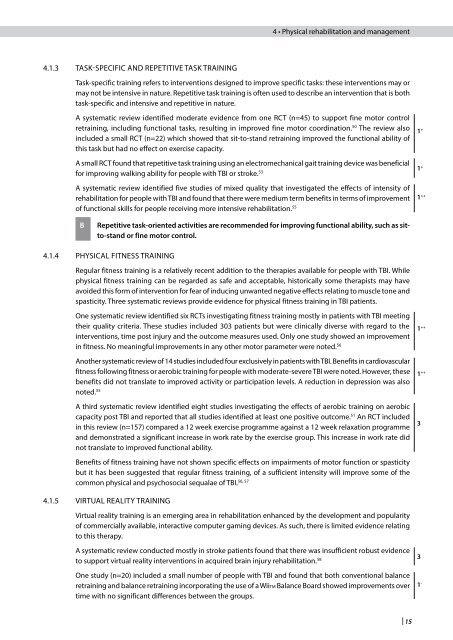sign130
sign130
sign130
Create successful ePaper yourself
Turn your PDF publications into a flip-book with our unique Google optimized e-Paper software.
4.1.3 TASk-SPECIFIC AND REPETITIVE TASk TRAINING<br />
Task-specific training refers to interventions designed to improve specific tasks: these interventions may or<br />
may not be intensive in nature. Repetitive task training is often used to describe an intervention that is both<br />
task-specific and intensive and repetitive in nature.<br />
A systematic review identified moderate evidence from one RCT (n=45) to support fine motor control<br />
retraining, including functional tasks, resulting in improved fine motor coordination. 50 The review also<br />
included a small RCT (n=22) which showed that sit-to-stand retraining improved the functional ability of<br />
this task but had no effect on exercise capacity.<br />
A small RCT found that repetitive task training using an electromechanical gait training device was beneficial<br />
for improving walking ability for people with TBI or stroke. 53<br />
A systematic review identified five studies of mixed quality that investigated the effects of intensity of<br />
rehabilitation for people with TBI and found that there were medium term benefits in terms of improvement<br />
of functional skills for people receiving more intensive rehabilitation. 55<br />
B Repetitive task-oriented activities are recommended for improving functional ability, such as sitto-stand<br />
or fine motor control.<br />
4.1.4 PHySICAL FITNESS TRAINING<br />
Regular fitness training is a relatively recent addition to the therapies available for people with TBI. While<br />
physical fitness training can be regarded as safe and acceptable, historically some therapists may have<br />
avoided this form of intervention for fear of inducing unwanted negative effects relating to muscle tone and<br />
spasticity. Three systematic reviews provide evidence for physical fitness training in TBI patients.<br />
One systematic review identified six RCTs investigating fitness training mostly in patients with TBI meeting<br />
their quality criteria. These studies included 303 patients but were clinically diverse with regard to the<br />
interventions, time post injury and the outcome measures used. Only one study showed an improvement<br />
in fitness. No meaningful improvements in any other motor parameter were noted. 56<br />
Another systematic review of 14 studies included four exclusively in patients with TBI. Benefits in cardiovascular<br />
fitness following fitness or aerobic training for people with moderate-severe TBI were noted. However, these<br />
benefits did not translate to improved activity or participation levels. A reduction in depression was also<br />
noted. 55<br />
A third systematic review identified eight studies investigating the effects of aerobic training on aerobic<br />
capacity post TBI and reported that all studies identified at least one positive outcome. 51 An RCT included<br />
in this review (n=157) compared a 12 week exercise programme against a 12 week relaxation programme<br />
and demonstrated a significant increase in work rate by the exercise group. This increase in work rate did<br />
not translate to improved functional ability.<br />
Benefits of fitness training have not shown specific effects on impairments of motor function or spasticity<br />
but it has been suggested that regular fitness training, of a sufficient intensity will improve some of the<br />
56, 57<br />
common physical and psychosocial sequalae of TBI.<br />
4.1.5 VIRTUAL REALITy TRAINING<br />
4 • Physical rehabilitation and management<br />
Virtual reality training is an emerging area in rehabilitation enhanced by the development and popularity<br />
of commercially available, interactive computer gaming devices. As such, there is limited evidence relating<br />
to this therapy.<br />
A systematic review conducted mostly in stroke patients found that there was insufficient robust evidence<br />
to support virtual reality interventions in acquired brain injury rehabilitation. 58<br />
One study (n=20) included a small number of people with TBI and found that both conventional balance<br />
retraining and balance retraining incorporating the use of a WiiTM Balance Board showed improvements over<br />
time with no significant differences between the groups.<br />
| 15<br />
1 +<br />
1 +<br />
1 ++<br />
1 ++<br />
1 ++<br />
3<br />
3<br />
1 -


